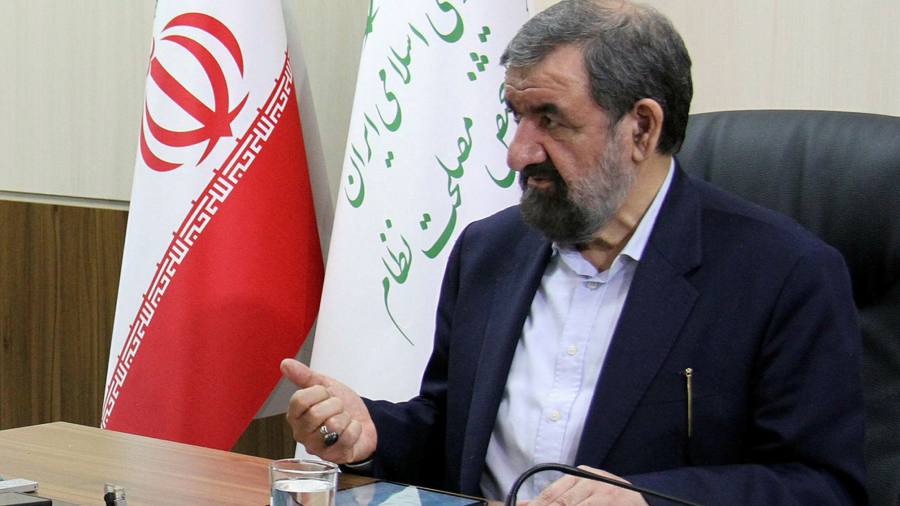[ad_1]
Iran would be ready to resume talks on the nuclear deal with the US and other western powers if they provide a “clear signal†that sanctions will be lifted within a year, a senior Iranian conservative figure and a potential presidential candidate has said.
“They can announce and reassure us that all sanctions imposed after the JCPOA [the 2015 nuclear accord] would be lifted in less than one year and tell us to go and negotiate this process,†Mohsen Rezaei, who led the Revolutionary Guards for 16 years, said in an interview with the Financial Times. These comments are the clearest indication yet of the Islamic republic’s willingness to engage with the US.
Donald Trump pulled the US out of the nuclear deal with global powers in 2018, imposing the toughest sanctions yet on the republic as his administration sought to secure a new deal that included Iran’s regional and military policies.
President Joe Biden is willing to return to the deal provided Iran, which has rolled back most of its commitments under the accord, also returns to full compliance. Iran said the US should return to the nuclear agreement unconditionally because it was the one that left it.
“We have to see every month during the talks that some sanctions which are of urgency to us are being lifted,†Rezaei said, outlining Iran’s most detailed demands yet for a return to the discussions.
“For instance, sanctions on financial transactions and restrictions that European banks have imposed should be lifted in the first month. Oil exports are also among our top priorities.â€
He said other US moves such as, for example, helping unfreeze billions of dollars of Iranian money held in overseas banks as an encouragement to start talks, would be akin to giving the republic “a candyâ€.
In recent weeks, all sides have taken steps to demonstrate their determination to find a way out. After a last-minute deal with the UN atomic watchdog, Iran softened the impact of its decision to stop snap inspections for three months.
European countries this week did not submit a resolution at the International Atomic Energy Agency, which was planned to criticise Tehran for its breaches of the nuclear deal. The US has said that it will be prepared to meet Iran in a format organised by the EU, as co-ordinator of the JCPOA joint commission.Â
Iran would use its “numerous leverages within our rights and international norms to make the US retreat and lift the sanctionsâ€, Rezaei said, adding that Iran “will not put a step forward as long as we do not see any actions from Americans and as long as there is no trust-buildingâ€. “Our nuclear programme will go ahead,†he added.
While the US and European countries have long wanted further agreements to curb Iran’s missile programme and role in regional conflicts, Tehran has always resisted this pressure. “Mr Biden may have some wishes,†but “they cannot be materialised in these fieldsâ€, Rezaei said.
“Iran also enjoys a very significant geopolitical position in the region. No issue can be addressed in the region without Iran’s involvement.â€
Rezaei said Iran saw no reason not “to develop defensive weapons within our legitimate defence policies which exclude atomic bombs and weapons as they are not acceptable to usâ€. Asked if the country intended to extend the current range for ballistic missiles, he added: “We consider such limitations [keeping the range for ballistic missiles at 2,000km] for now as long as our enemies do not develop missiles beyond this range to hit us.â€
Rezaei, 66, is the secretary of the Expediency Council, which drafts the country’s macro policies for approval by supreme leader Ayatollah Ali Khamenei, and stepped down as head of the guards in 1997. Unusually, he was allowed to return to the military seven years ago and still wears his uniform on special occasions.
With centrist president Hassan Rouhani set to stand down this year after two terms, a power struggle between hardliners has intensified. Rezaei, who has run for president twice before, is tipped as a hardline presidential candidate. Asked about the presidency, he said he had not decided.
Pro-reform forces have voiced concern about military figures occupying one of the state’s most senior roles. “What’s wrong if military figures come to power [presidency] through democratic means?†Rezaei said, citing France’s Charles de Gaulle and the US’s Dwight D Eisenhower. “Iranians have come to the conclusion that they need a strong, effective and responsible government which is held accountable. These features are stronger in a veteran and military figures than others.â€
He rejected speculation that hardliners might delay engagement with the US until after the election. The timing of talks depends on the country’s “national interestsâ€, he said, stressing that it was the supreme leader who defined the policy on negotiation. “This time again there is one voice coming out of Iran as happened during the nuclear talks [2013-2015] and that is what the supreme leader says.â€
Rezaei shrugged off the impact of sanctions on a country that is battling high inflation and recession and said Iran should prioritise its economy.
“There is no reason for us to help security in Iraq and Syria, and then to see other countries reap economic benefits. Iranian-made goods should have a strong presence in the region,†he said.
[ad_2]
Source link







